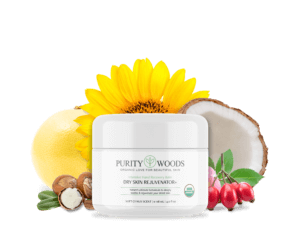If you’ve noticed your skin starting to feel drier as you get older, you aren’t alone.
Everyone’s complexion is different, but for most people, dryness is a very noticeable sign of skin aging. It often starts out mild but can continue to worsen if not addressed and may lead to other issues like itchiness, roughness, flakiness, and red patches.
The good news is that there are some straightforward steps you can take to combat your dry skin. All of them not only work to address a specific cause of dry skin but will also help to give your complexion a more youthful appearance overall.
But first, it’s important to understand what happens to your skin as you age and why it starts to dry out.
What Happens to Your Skin as You Age
Physical Changes Occur
Wrinkles, fine lines, dark spots, and dry-looking skin are all visible signs of aging. However, most of the changes that take place within your skin as it ages aren’t so obvious.
One of the biggest changes involves collagen, a super important skin protein. Not only does collagen help to keep your skin plump and firm— fending off wrinkles and fine lines in the process— it also plays a role in skin elasticity and hydration.
Unfortunately, collagen production declines with age, which contributes greatly to visible signs of aging as well as dry skin.
Along with loss of collagen, skin also tends to produce fewer natural oils over time due to reduced oil gland function. With fewer oils present in your skin, moisture has a much greater chance of evaporating, causing skin to dry out more quickly.
Changes also occur to components that are involved in binding water to the top layer of your skin.
Collectively, these components are known as natural moisturizing factor (NMF) and play a large role in both protecting your skin from damage and keeping it hydrated. But just like with collagen, NMF levels tend to decline with age, leaving your skin more susceptible to dryness and irritation.
Environmental Stressors Cause Damage
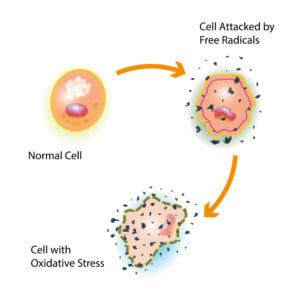
Changes that occur within your own body aren’t the only contributors to skin aging. Over the years, your skin is also exposed to numerous external stressors from the environment.
The exact stressors that affect your skin depend a great deal on where you live and your lifestyle. However, some of the most common include:
- Harsh weather
- Air pollution
- Toxins from skincare products
- Radiation
- Unhealthy diet
- Alcohol/smoking
While some of these can have an immediate impact on your skin (alcohol, for example, dehydrates skin), the biggest problem is that exposure to these stressors stimulates free radical production.
Free radicals are reactive and unstable molecules. They are normally present within your body but start to cause damage to cells and tissue when they multiply beyond what your system can handle. This includes damage to skin cells, which can drastically accelerate the aging process.
Now, there are ways you can combat free radical damage, but it’s important to realize just how much your environment and lifestyle affect the health of your skin.
And there’s one particular environmental stressor that affects it more than all the others…
UV Radiation Accelerates Skin Aging
The single biggest environmental stressor for your skin is the sun. Overexposure to sunlight— or more specifically, the UV rays found in sunlight— is thought to be responsible for up to 80% of environmental skin damage.
The type of skin damage caused by excessive exposure to UV radiation is known as photodamage or photoaging. It can and will lead to visible signs of aging (and potentially skin cancer), but you won’t necessarily know when it happens.
This is because photodamage occurs within the deepest layers of your skin at the cellular level. The UV rays cause changes to DNA and skin cells that are significant but may not be seen visibly until years down the road.
When the damage does work its way up to the top layer of your skin, it shows up as all the familiar signs of aging: wrinkles, dark spots, uneven skin texture, broken capillaries, etc. Photodamage also generates free radicals, which may contribute to impaired skin function and dryness down the road.
Paler complexions are more susceptible to photodamage than darker ones, but it can affect any skin type. The only way to avoid it is by consistently protecting your skin from UV radiation.
The End Result: Impaired Skin Barrier Function
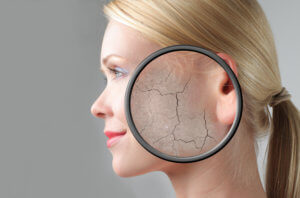
Age-related skin changes and environmental stressors all have something in common: They contribute to impaired skin barrier function.
Though you can’t see it, your skin’s natural barrier has an incredibly important job. It acts as a defensive shield to keep harmful toxins and pathogens out of your body while also keeping moisture from evaporating so that your skin stays hydrated.
To accomplish these goals, your skin barrier is built almost like a wall. It’s made up of tough cells called corneocytes that act like bricks and a lipid layer that acts like mortar to bind the corneocytes together.
Unfortunately, the cumulative effects of decreased oil production, free radical damage, etc. cause your skin barrier to break down over time. This means that it won’t function as well as it used to, leading to a variety of skin issues.
Of course, one of the most notable issues associated with impaired skin barrier function is dry skin.
A compromised skin barrier leads to increased transepidermal water loss (TEWL), meaning your skin is less able to hold onto moisture. As a result, your skin feels drier than it used to and you may notice more roughness, flakiness, and itchiness.
Fortunately, there is a lot you can do to combat dry skin as you age, including addressing some of the root causes of dryness.
Top Tips for Dry, Aging Skin
Use a Quality Anti-Aging Moisturizer
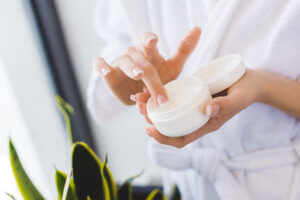
Since your skin can’t keep itself hydrated like it used to, a quality moisturizer is a must. The right moisturizer will ease dry skin by pulling in moisture and keeping it locked in all day.
Ideally, look for a combination of humectant, emollient, and occlusive ingredients in your moisturizer.
Humectants, like aloe vera and glycerin, draw moisture from the air to your skin, improving hydration. Occlusives, like mango seed butter and cocoa butter, form a protective layer over your skin that keeps moisture from evaporating. Emollients, like sunflower oil, complete the puzzle by smoothing out dry and flaky-looking skin.
Also, don’t forget to look for a moisturizer that contains anti-aging ingredients. These will help to reverse the appearance of skin aging and really boost your skin long-term.
For the perfect combination of all of the above, consider using the Age-Defying Dream Cream from Purity Woods, which provides both serious hydration and anti-aging power.
Choose a Gentle, Non-Stripping Facial Cleanser
Cleansing your skin is an important part of an anti-aging skincare regimen, but it can be very drying to your complexion if you use the wrong type of cleanser.
In essence, you want to clean dirt and debris from your pores without stripping your skin of its natural oils.
To do this, look for a gentle, natural cleanser that contains both cleansing and moisturizing ingredients. A few of the best include licorice root extract, which cleanses and soothes skin, jojoba oil, which hydrates without clogging pores, and chamomile extract.
For gentle cleansing and nourishing, anti-aging ingredients, try the Pur-Radiance face cleanser from Purity Woods.
“Feed” Your Skin Antioxidants
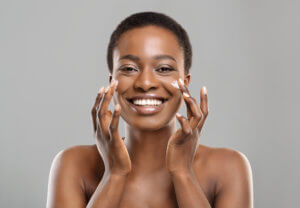
As you may recall, free radical damage is one of the biggest accelerators of skin aging and contributes to impaired skin barrier function.
Antioxidants are the best protection your skin (and body) has against free radicals because they can neutralize the unstable molecules, limiting their damage. Not all antioxidants directly improve dry skin, but they do important work at the cellular level to combat skin aging as a whole.
A few specific antioxidants to “feed” your skin via food or skincare products include:
- Vitamin E— Antioxidant and moisturizing power
- Vitamin C— Boosts collagen production
- Vitamin A— Combats wrinkles
- Bakuchiol— A “natural retinol alternative” that won’t dry out skin
- Resveratrol— Protects against photodamage
- Astaxanthin— Improves skin texture and hydration
Fill Up on Collagen Boosters
Because collagen levels start dropping as you age, it’s important to incorporate natural collagen boosters into your diet and skincare routine. Remember, collagen is key to both youthful-looking skin and hydration, so boosting it should be a priority.
One of the best natural collagen boosters is none other than vitamin C.
Not only is vitamin C a powerful antioxidant and essential nutrient, it also stimulates collagen synthesis AND can fade the appearance of dark spots, decrease redness, and help protect against UV damage.
You can easily add more vitamin C to your diet through whole foods like citrus fruit, mango, kiwi, colored bell peppers, and leafy greens. It can also be applied topically via ingredients like mango seed butter, camu camu, and Indian gooseberry (amla).
Add More Omega-3s to Your Diet
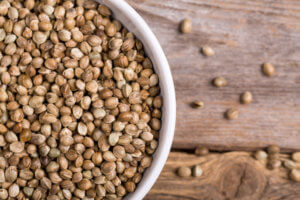
Your skin needs a variety of nutrients to thrive, but omega-3 fatty acids can be particularly helpful for dry skin. They have been shown to improve skin moisture, reduce sensitivity, and even help protect against photodamage.
The American diet is often deficient in omega-3, but you can remedy this by eating more fish and/or taking a fish oil supplement. If you prefer a plant-based alternative, you can opt for an algae supplement instead or consume a range of plant foods like chia seeds, hemp seeds, walnuts, and seaweed.
Omega-6 fatty acids are also beneficial for replenishing your skin’s natural oils to improve hydration.
However, many people over-consume omega-6 foods and under-consume omega-3 foods, so getting enough omega-6 is not usually a problem.
Avoid Habits that Dry Out Your Skin
Certain habits can dry out your skin and make it look older. When you were young, it was easier for your skin to bounce back from a bad habit, but it becomes more difficult for your skin to recover the older you get.
Overexposing your skin to UV radiation is definitely at the top of the list of habits to avoid. To avoid this, protect your skin by applying sunscreen daily and/or using hats and clothing to shield your skin when you plan to be outdoors for a while.
Some other habits that have a drying effect on skin include:
- Using hot water to shower or wash your face (opt for warm water instead)
- Over-exfoliating
- Smoking
- Not getting enough sleep
- Drinking alcohol frequently
On the flip side, consider starting some good habits like using a humidifier indoors during the cold winter months and drinking lots of water throughout the day.
Give Your Skin Extra Care at Night

Your body does its deepest repair work while you sleep, and this includes repairing and regenerating skin cells. That’s why it’s especially important to cleanse your skin at night and apply a moisturizer (preferably one with anti-aging ingredients).
By putting all the “good stuff” on your skin shortly before you go to sleep, you give your body the resources it needs to do some serious skincare work overnight.
If desired, you can apply a serum to your skin after cleansing and before moisturizing to add extra hydration and anti-aging power. Make sure you finish your routine with a nourishing moisturizer— like the Age-Defying Night Cream from Purity Woods— to lock everything in.
Pay Special Attention to the Skin Around Your Eyes
When it comes to your face, the skin around your eyes can be particularly quick to dry out. That’s because it’s thinner than the rest of your skin and doesn’t contain any oil glands.
Dry skin around your eyes can accentuate signs of aging like crow’s feet and under-eye bags, which is not what you want. Taking just a little time in your skincare routine to nourish this area of skin can make a big difference to how it looks and feels.
Of course, you can use your normal moisturizer around your eyes, but it’s better to apply an eye cream that is specifically formulated for this delicate area of skin.
If you don’t have a go-to eye cream, look into the Age-Defying Eye Cream from Purity Woods, which is full of nourishing botanicals like rosehip seed oil and maple leaf extract.
Fight Dry Skin from Head to Toe
You now know the “secrets” of why skin tends to become dry as you age and what you can do about it. And while dryness often shows up most notably in the face, make sure you don’t forget about the rest of your body!
If you find yourself struggling with rough and dry skin on your hands, elbows, heels, etc., take a look at the Dry Skin Rejuventor+ from Purity Woods.
This deeply rejuvenating balm is made with nature’s most nourishing ingredients, including rosehip oil, coconut oil, shea butter, and sunflower oil. The entire formula is USDA Certified Organic, which means absolutely no toxins, synthetic additives, or GMOs.
Learn more about the Dry Skin Rejuvenator+ here, and make changes as necessary to your daily routine to ease dry skin and rejuvenate your complexion.


